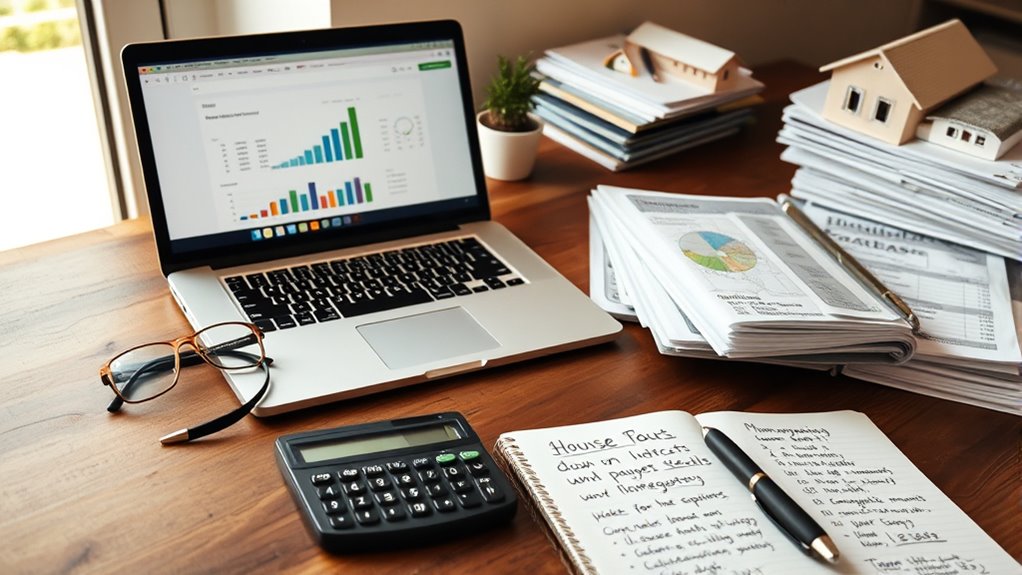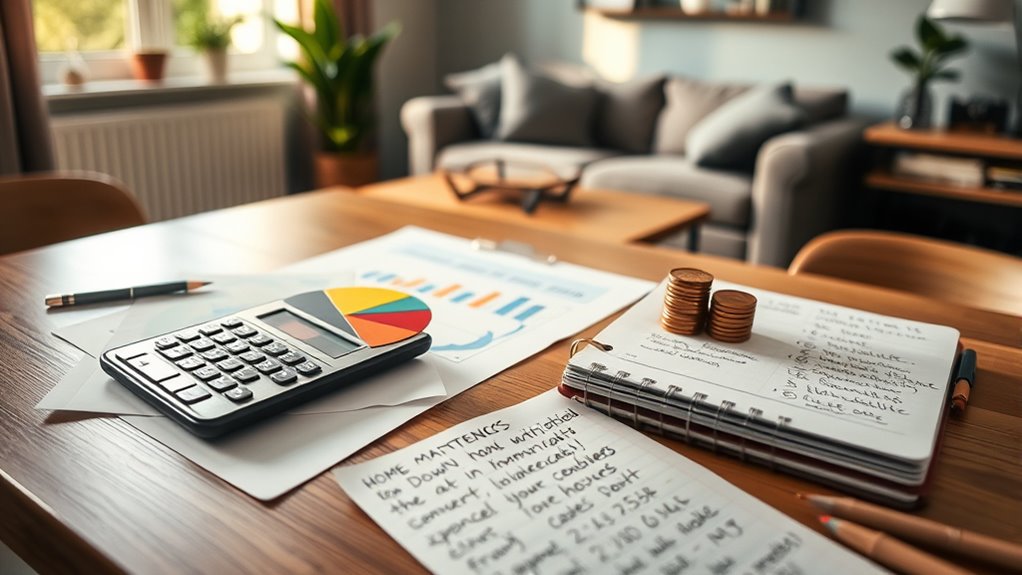To budget for homeownership, start by saving for a down payment, aiming for 3% to 20% of the home’s price, which can lower your mortgage and eliminate PMI. Include closing costs, property taxes, and homeowners insurance in your initial budget. Ongoing, set aside funds for regular maintenance, repairs, and other recurring expenses like HOA fees. Planning ahead will keep your finances stable; stay with us to discover detailed tips for each step.
Key Takeaways
- Determine your total homeownership costs, including down payment, mortgage, taxes, insurance, and HOA fees.
- Save a sizable down payment (3%-20%) to reduce mortgage amount and eliminate PMI if possible.
- Budget for closing costs, typically 2%-5% of the home’s price, covering fees like inspections and title insurance.
- Plan for ongoing expenses such as property taxes, insurance, maintenance, and unexpected repairs.
- Create a comprehensive budget that includes initial costs and reserves for routine upkeep to ensure long-term affordability.

Buying a home is a significant financial commitment, but with proper budgeting, you can make the process smoother and more manageable. One of the first things to consider is your mortgage options. Different lenders offer various types of mortgages, such as fixed-rate, adjustable-rate, or government-backed loans like FHA or VA. Each comes with its own benefits and drawbacks, so it’s essential to explore these options thoroughly. Your choice will impact your monthly payments, interest rates, and the total amount you pay over the life of the loan. By understanding your mortgage options, you can choose a plan that fits your financial situation and long-term goals.
Understanding mortgage options helps you choose the best plan for your financial goals.
As you plan your budget, consider the role of home equity. When you buy a home, you’re building equity with each mortgage payment, which is the difference between your home’s market value and what you owe. Over time, as you pay down your mortgage, your home equity increases, giving you a valuable asset. Some lenders offer home equity loans or lines of credit, which can be useful for funding renovations or covering unexpected expenses. Knowing how much equity you have, and how it can be accessed, helps you plan for future financial needs and avoid overextending yourself.
Next, you should focus on your down payment. Typically, a larger down payment reduces your mortgage amount and can improve your loan terms. Aim to save at least 3% to 20% of the home’s purchase price, depending on the loan type. Keep in mind that a bigger down payment may also lower your monthly payments and eliminate the need for private mortgage insurance (PMI). When budgeting, don’t forget to account for closing costs, which usually range from 2% to 5% of the home price. These include fees for appraisals, inspections, title insurance, and other expenses associated with finalizing the sale.
Beyond the initial costs, ongoing expenses are vital to consider. Property taxes, homeowners insurance, and potential homeowners association (HOA) fees add to your monthly obligations. It’s also wise to set aside funds for maintenance and repairs, which can unexpectedly arise. Regular upkeep—like HVAC servicing, roof repairs, and landscaping—can prevent costly problems later. Budgeting for these expenses ensures you’re prepared and helps keep your home in good condition.
Frequently Asked Questions
How Can I Build an Emergency Fund for Unexpected Home Expenses?
To build an emergency fund for unexpected home expenses, start by setting aside a portion of your income regularly. Aim for at least three to six months’ worth of living expenses, including home insurance and maintenance costs. Keep this emergency savings in a separate, easily accessible account. Automate your savings to stay consistent, and prioritize this fund to guarantee you’re prepared for surprises like repairs or insurance claims.
What Are the Hidden Costs of Homeownership Often Overlooked?
Think of homeownership as steering a vast ocean—you might spot hidden reefs before they strike. Overlooked costs often include a home inspection, which is your ship’s radar, and homeowner’s insurance, a sturdy life raft against unexpected storms. Property taxes and ongoing maintenance can sneak up like sudden squalls, so always set aside extra funds. Staying vigilant guarantees your voyage remains steady, avoiding surprises that could sink your financial ship.
How Do Property Taxes Impact My Overall Budget?
Property taxes directly impact your overall budget because they depend on your property’s valuation and tax assessment. When your property’s value increases, expect higher taxes, which means you’ll need to allocate more funds annually. Keep an eye on your tax assessment notices, as they determine your property tax amount. Planning for these costs guarantees you won’t be caught off guard and helps you maintain a realistic budget for homeownership.
Should I Factor in Future Home Renovations When Budgeting?
Yes, you should definitely consider future home renovations when budgeting. Even if you think your home is move-in ready, unexpected repairs or upgrades often come up. Incorporate future renovation planning into your budget with accurate renovation cost estimation, so you’re prepared financially. This proactive approach helps prevent surprises, ensures your home stays in good shape, and keeps your finances on track for long-term ownership.
How Can I Reduce Ongoing Maintenance Costs Effectively?
You can reduce ongoing maintenance costs by regularly servicing appliances to prevent costly repairs and budgeting for landscaping costs to avoid surprises. Keep up with routine inspections, clean gutters, and maintain HVAC systems. Consider investing in durable materials that need less upkeep. Scheduling preventive maintenance helps catch issues early, saving you money long-term. Staying proactive and attentive to these areas can markedly lower your ongoing maintenance expenses.
Conclusion
Think of homeownership as tending a garden—you need to nurture it with careful budgeting to keep it thriving. By planning for everything from your down payment to ongoing maintenance, you’re watering your future stability. Stay vigilant and adjust your budget as needed, and your home will flourish into the sanctuary you envisioned. Remember, a well-tended garden rewards you with beauty and peace—so keep your finances cultivated with care.








